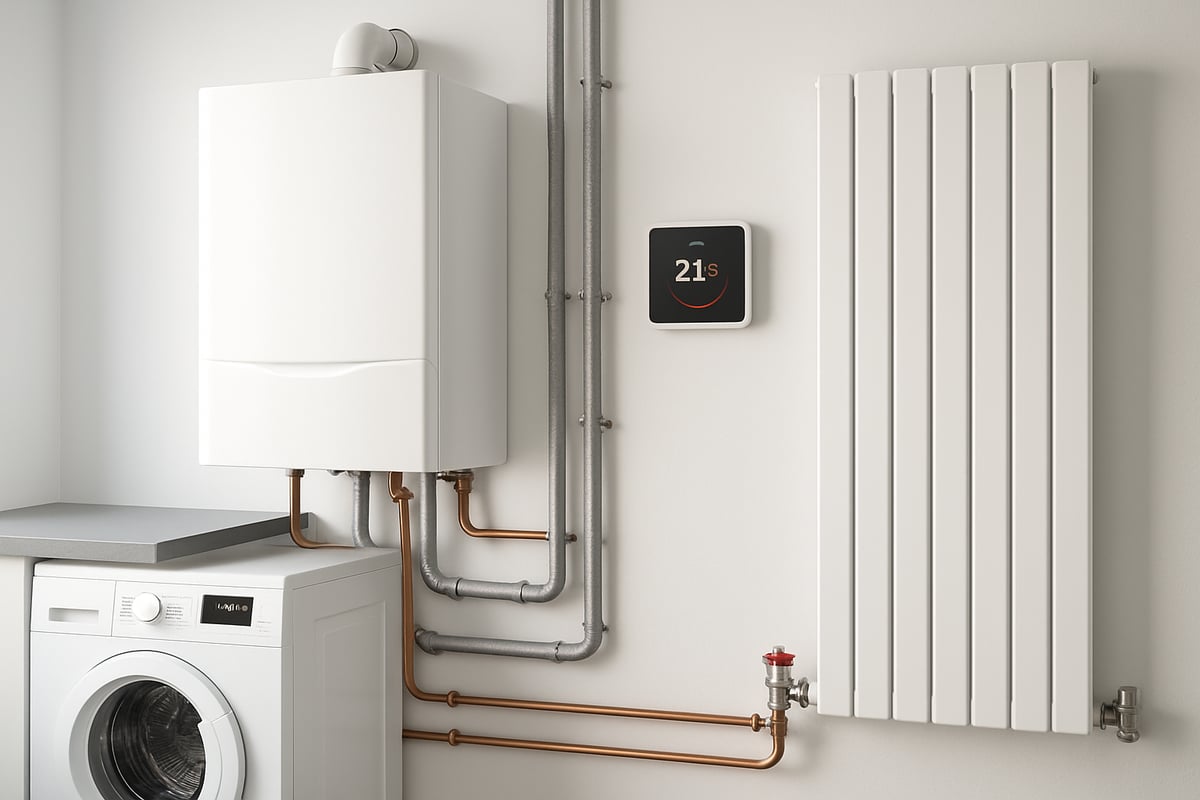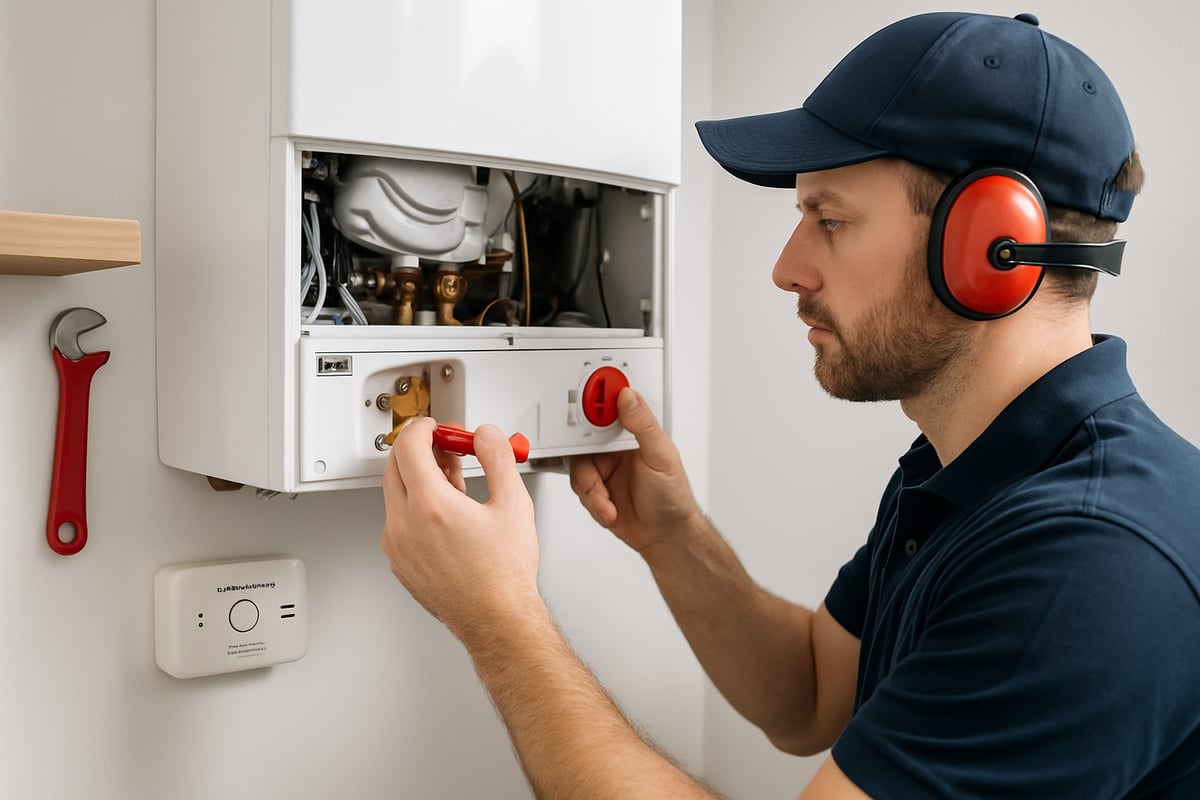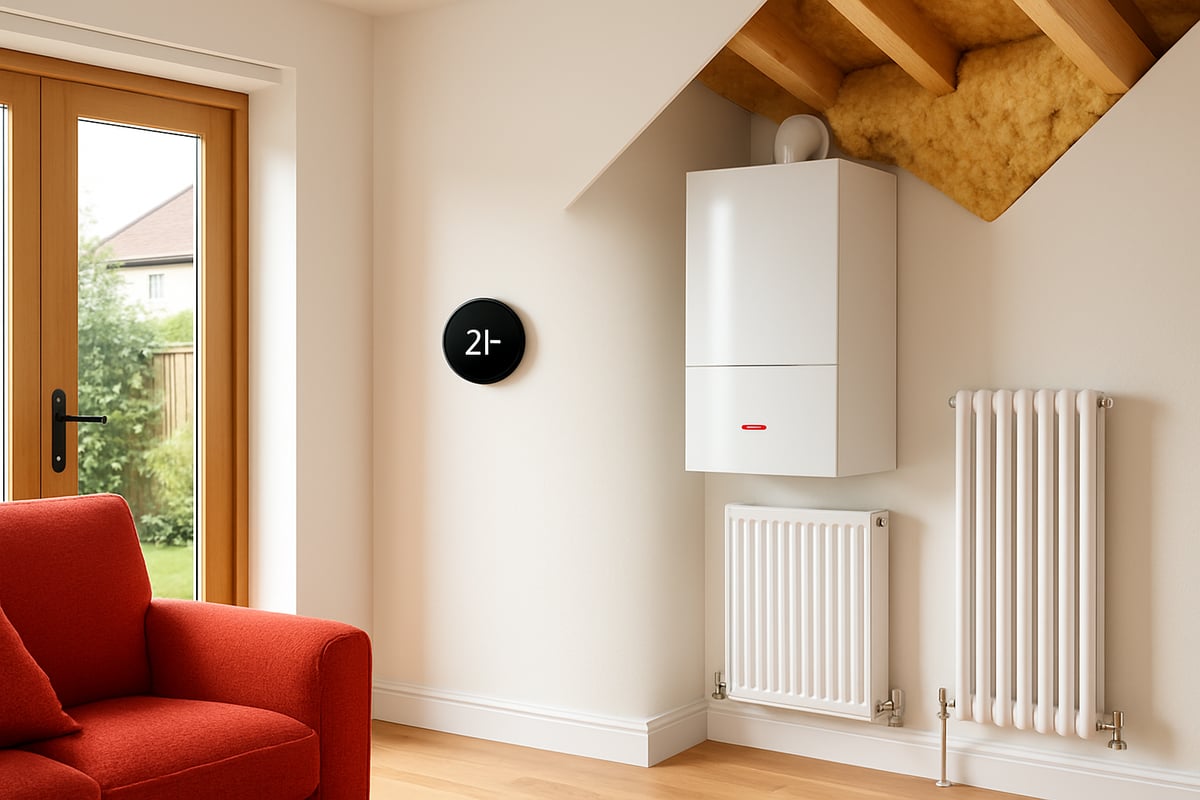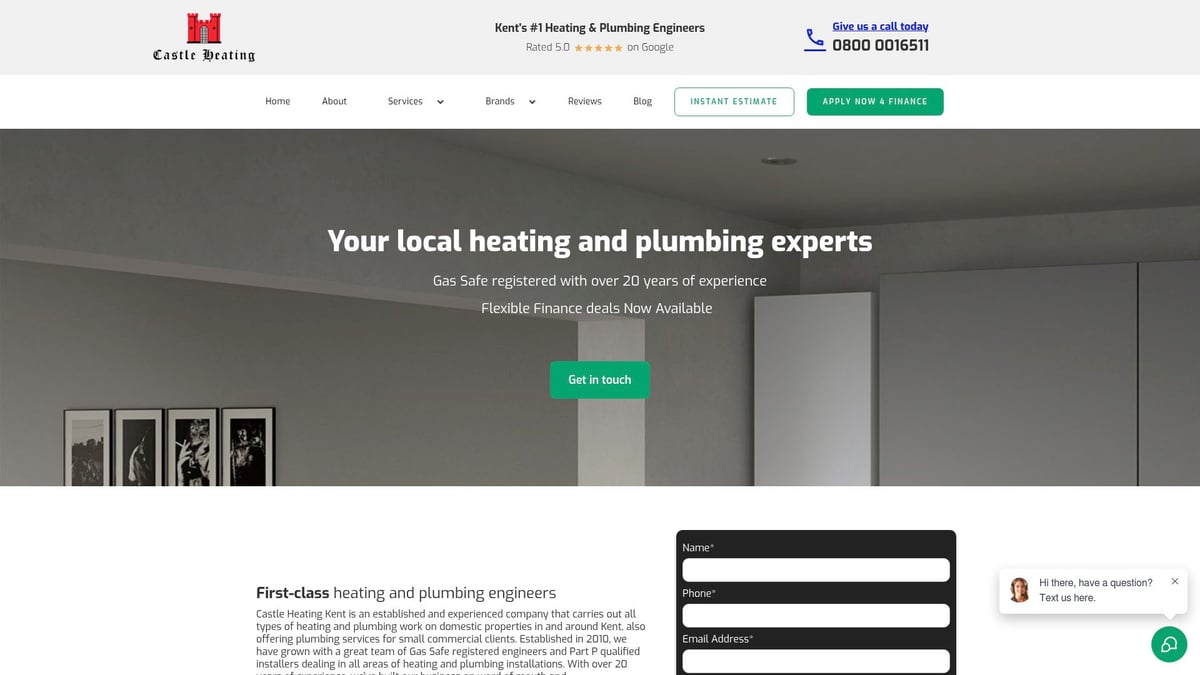Boiler and Heating Guide: Essential Tips for 2025
As the world of boiler and heating rapidly changes, staying warm and efficient in your home is more important than ever. With rising costs and new technology on the horizon, making the right choices for your boiler and heating system can mean real savings and comfort.
This guide will walk you through the latest innovations, essential maintenance routines, cost-saving strategies, and expert tips for 2025. Ready to boost efficiency, cut bills, and future-proof your home? Let’s dive in.
Understanding Modern Boiler and Heating Systems
Modern boiler and heating systems are evolving quickly, offering homeowners more comfort, efficiency, and control than ever before. Whether you’re considering an upgrade or simply want to keep your system running at its best, understanding your options is key. Let’s break down the essentials for 2025.

Types of Boilers Explained
There are three main types of boiler and heating systems found in UK homes: combi, system, and conventional boilers. Each suits different household needs.
| Boiler Type | Suits | Hot Water Storage | Efficiency (ErP) |
|---|---|---|---|
| Combi | Flats, small homes | No | A-rated |
| System | Medium/large homes | Yes | A-rated |
| Conventional | Large/older homes | Yes (tank) | B–A-rated |
Combi boilers are the most popular, with the Energy Saving Trust noting their dominance in UK homes. They provide hot water on demand and save space, making them ideal for smaller properties. System boilers are best for larger families needing simultaneous hot water from multiple taps, while conventional boilers suit older properties with existing tanks. Always check the efficiency rating when considering a boiler and heating upgrade.
Advancements in Heating Technology for 2025
Technology is shaping the future of boiler and heating systems. Smart thermostats and controls let you manage temperatures remotely and adapt your heating to your lifestyle. Hybrid systems, such as those combining a boiler with a heat pump, are growing in popularity for their energy-saving potential.
Integration with renewable sources like solar panels is becoming mainstream. Remote diagnostics allow engineers to spot issues before they become problems. Did you know that smart thermostats can cut energy use by up to 10%? If you’re curious, explore the benefits of installing a smart thermostat for your setup.
Key Components of a Central Heating System
A boiler and heating system is more than just the boiler itself. Key components include:
- Radiators: Distribute heat throughout the home. Modern designs offer better efficiency and style.
- Pipework: Carries hot water to each room. Well-insulated pipes reduce heat loss.
- Controls: Programmable thermostats and smart TRVs (thermostatic radiator valves) enhance control and comfort.
Upgrading to efficient radiators and adding TRVs can significantly improve comfort, allowing you to tailor the temperature in each room. Every component in your boiler and heating setup plays a vital role in overall efficiency.
Choosing the Right System for Your Home
Selecting the best boiler and heating system depends on your property size, insulation quality, and hot water needs. For future-proofing, consider whether you’ll extend your home or upgrade insulation.
It’s wise to have a professional assess your requirements, though thorough DIY research can also help. Remember, a system that’s too large for your space will waste energy and money. The right fit ensures your boiler and heating system runs efficiently and cost-effectively.
Common Myths and Misconceptions
Some believe that bigger is always better when it comes to boiler and heating systems, but this isn’t true. An oversized boiler leads to higher bills and less comfort.
Also, don’t confuse boiler cover with a manufacturer’s warranty—they provide different types of protection. Finally, annual servicing is not just a box-ticking exercise; it’s essential for safety and efficiency. Stay informed and avoid these common pitfalls.
Essential Boiler Maintenance and Safety Tips
Keeping your boiler and heating system in top condition is vital for safety, efficiency, and peace of mind. With regular attention, you can avoid costly breakdowns and keep your home warm all year. This section offers practical advice on routine checks, professional servicing, and staying safe in 2025.

Annual Servicing: Why It Matters
An annual service is the cornerstone of reliable boiler and heating performance. For landlords, it's a legal requirement to have gas appliances checked every year. Homeowners also benefit from regular servicing, as it helps spot small issues before they escalate.
During a service, engineers check for gas leaks, test for carbon monoxide, and inspect all major components. Regular maintenance can prolong your boiler's lifespan and make sure it runs efficiently. Data shows that yearly servicing reduces the risk of breakdowns by up to 50%, saving you on emergency repairs and keeping your boiler and heating system safe.
DIY Maintenance Tasks Every Homeowner Can Do
While some jobs need a professional, there are essential DIY checks to keep your boiler and heating running smoothly. Bleeding radiators removes trapped air, improving heat distribution. Check the pressure gauge regularly; low pressure is often fixed by topping up the system as per your manual.
Look for leaks, unusual noises, or error messages on the display. Cleaning dust from the boiler's exterior keeps vents clear. These simple steps help spot problems early and support the overall health of your boiler and heating setup. Always turn off power before any DIY task, and never open the boiler casing yourself.
Signs Your Boiler Needs Professional Attention
Not every issue is a DIY fix. Call a qualified engineer if you hear persistent banging or kettling noises, notice a drop in pressure, or see water leaks. Error codes on digital displays often signal underlying faults. If your heating isn’t working or the pilot light keeps going out, don’t ignore it.
For more guidance on what to look out for and troubleshooting steps, visit Common boiler problems and fixes. Acting promptly protects your boiler and heating investment and ensures your home stays safe and comfortable.
Gas Safety and Carbon Monoxide Awareness
Gas safety is a non-negotiable part of boiler and heating care. Always use Gas Safe registered engineers for installation and repairs. Install carbon monoxide (CO) alarms near your boiler and test them regularly. CO is odourless and deadly, causing around 60 deaths per year in the UK according to the NHS.
Learn to recognise the symptoms of CO poisoning: headaches, dizziness, nausea, and confusion. If you suspect a leak, leave the property and call emergency services. Staying vigilant with gas safety and CO awareness keeps your family protected and your boiler and heating system compliant.
The Role of Boiler Cover and Warranties
Boiler cover provides an extra layer of security for your boiler and heating system. Policies often include annual servicing, emergency repairs, and parts replacement. Warranties, on the other hand, are usually offered by manufacturers and may have more restrictions.
Check what’s included: some plans have limits on the age or type of boiler, while others offer unlimited claims. For example, companies like HomeServe provide unlimited claims and a free service in the first year. Understanding your boiler and heating cover ensures you’re not caught out by exclusions or unexpected costs.
Maximising Energy Efficiency and Reducing Heating Costs
Cutting energy bills and boosting comfort are top priorities for UK homeowners facing rising costs. With the right boiler and heating strategies, you can make your home warmer, greener, and more affordable all year round. Let’s break down the most effective ways to maximise energy efficiency and keep those costs in check.

How to Improve Boiler Efficiency
Getting the most from your boiler and heating system starts with regular attention. Book an annual service to keep everything running smoothly and spot small issues before they become expensive repairs. Upgrading to a modern condensing boiler can increase efficiency to around 90%, while older models often waste energy.
Small tweaks like cleaning the heat exchanger and using weather compensation controls can help your boiler and heating system work smarter, not harder. Always keep an eye on system pressure and bleed radiators if you notice cold spots. For more detailed tips, check out this guide on how to improve boiler efficiency.
Smart Heating Controls and Zoning
Modern homes benefit hugely from smart controls. With a smart thermostat and thermostatic radiator valves (TRVs), you’ll gain precise control over your boiler and heating system. These tools let you create zones, so you only heat rooms in use—ideal for busy families or large houses.
Mobile apps allow remote adjustments, so your home is always warm when you arrive. Smart controls can save between £75 and £155 per year, according to the Energy Saving Trust. With boiler and heating systems evolving, investing in these features is a smart way to boost comfort and cut waste.
Insulation and Home Improvements
No matter how efficient your boiler and heating setup is, poor insulation means money lost through walls, lofts, and floors. Start with loft insulation and cavity wall insulation—these upgrades can reduce heat loss by up to 35%.
Don’t forget draught-proofing windows and doors, and consider upgrading to double or triple glazing for added comfort. Even simple steps, like fitting draft excluders, can make a noticeable difference. By combining strong insulation with an efficient boiler and heating system, you’ll create a home that stays cosy for less.
Managing Heating Schedules for Savings
A clever heating schedule is the backbone of efficient boiler and heating use. Setting timers ensures your system only runs when needed, avoiding unnecessary heating when the house is empty or everyone’s asleep.
Lowering your thermostat by just 1°C can save around £100 a year without sacrificing comfort. Review your household’s routine and adjust settings to match occupancy. With a well-managed schedule, your boiler and heating system won’t waste energy, keeping bills firmly under control.
Grants, Schemes, and Financial Support
Upgrading your boiler and heating system can be a significant investment, but help is available. The Boiler Upgrade Scheme, ECO4, and local council grants often support improvements like heat pumps, insulation, or new efficient boilers.
Eligibility usually depends on your home’s current efficiency and personal circumstances. Successful applicants can receive up to £5,000 for heat pump installations, reducing upfront costs. Always research current grants before planning major boiler and heating upgrades to make the most of available support.
Step-by-Step Guide: Upgrading or Replacing Your Boiler in 2025
Upgrading your boiler and heating system is a big investment, but it pays off in comfort, reliability, and lower energy bills. Whether your current system is showing its age or you want to future-proof your home, this step-by-step guide has you covered. Follow these practical tips to make your 2025 upgrade smooth and stress-free.
Assessing When to Replace Your Boiler
Knowing when to replace your boiler and heating system can save you money and avoid unexpected breakdowns. Most boilers last between 10 and 15 years, but if yours is needing frequent repairs, losing efficiency, or struggling to heat your home, it may be time for an upgrade. Rising energy bills and unreliable performance are classic warning signs.
If you’re unsure, check out Signs you need a new boiler for a detailed list of what to watch for. Replacing an old boiler and heating setup with a new, efficient model can cut bills by up to 30%. Don’t wait until it fails completely—plan ahead for a smoother transition.
Choosing the Right Installer and Getting Quotes
The success of your boiler and heating upgrade depends heavily on choosing a reputable installer. Always verify that your engineer is Gas Safe registered for legal compliance and safety. Aim to get at least three quotes for your boiler and heating job so you can compare prices, warranties, and levels of service.
Review feedback and accreditations—look for companies with Which? Trusted Trader status as a sign of quality and trustworthiness. Don’t be swayed by the cheapest option alone. Professionalism, clear communication, and transparent pricing matter just as much for a hassle-free experience.
The Boiler Installation Process Explained
Once you’ve chosen a trusted installer, the boiler and heating upgrade process begins with a pre-installation survey. This checks your property’s needs and ensures the right system is chosen. The installer will remove your old boiler and heating components, then fit the new system—usually within one to two days.
Key steps include:
- System design and planning
- Safe removal of old units
- Installation of new boiler and heating controls
- Full safety checks and commissioning
A professional job keeps disruption minimal and ensures your new boiler and heating setup works efficiently from day one.
What to Expect After Installation
After the installation, your engineer will flush and balance the boiler and heating system to remove debris and optimise performance. They’ll provide a user demonstration so you know how to operate your new controls and manage heating schedules.
Registration for the warranty and Building Regulations compliance is essential—ask for paperwork before your installer leaves. Proper setup of your boiler and heating system helps avoid early teething issues and ensures long-term reliability. Schedule your first annual service to keep your system in peak condition.
Castle Heating Kent: Your Local Boiler Experts
When it comes to boiler and heating upgrades in Kent, Castle Heating Kent stands out for expertise and service. Their team covers everything from installation and servicing to repairs in Rochester, Gravesend, and across the region.

All engineers are Gas Safe registered and Which? Trusted Traders, ensuring your boiler and heating is in safe hands. Flexible finance options and instant online estimates make budgeting easy. With 24/7 emergency response and a reputation for 5-star reviews, Castle Heating Kent is the trusted choice for local boiler and heating solutions.
Future-Proofing Your Home Heating: Trends and Regulations for 2025
Curious about where boiler and heating technology is heading in 2025? The landscape is shifting fast, with new targets, systems, and incentives shaping how we’ll keep our homes warm and efficient. Let’s explore what’s changing, what’s required, and how you can stay ahead.
The Move Towards Low-Carbon Heating
The UK is accelerating its journey towards net zero, making low-carbon boiler and heating solutions more important than ever. Government targets focus on dramatically reducing emissions by 2050, and that means big changes for homeowners.
Heat pumps, hybrid systems, and hydrogen-ready boilers are all gaining traction. The Boiler Upgrade Scheme offers grants to support the switch to cleaner options, sometimes covering up to £5,000. Choosing greener boiler and heating technology now can help future-proof your home and lower your bills.
Upcoming Regulations and What They Mean for Homeowners
Regulations are tightening, and understanding the rules is crucial for anyone upgrading their boiler and heating systems. Changes to Building Regulations—especially Part L—are raising minimum efficiency standards for new installations.
From 2025, gas boilers will be banned in newbuilds in England. Existing homes will need to meet higher standards when replacing systems. The Future Homes Standard 2025 details what to expect, ensuring your boiler and heating choices are compliant and ready for the future. Retrofitting may be required for older properties to keep pace.
Integrating Renewable Energy with Your Heating System
Modern boiler and heating setups are increasingly designed to work with renewables. Solar thermal panels can provide up to 60% of your annual hot water needs, reducing demand on your main boiler and heating source.
Heat pumps can often be integrated with existing radiators, while battery storage and smart grid technology help maximise efficiency. These upgrades not only cut emissions but also make your home less dependent on fluctuating energy prices.
Preparing for the Unexpected: Resilience and Backup Solutions
No matter how advanced your boiler and heating system is, having a backup plan is wise. Consider electric heaters, multi-fuel stoves, or even emergency boiler cover to keep you warm if something goes wrong.
Rapid repair services and 24/7 support can be invaluable during extreme weather or power cuts. Planning ahead ensures your home stays comfortable, whatever the circumstances.
The Importance of Ongoing Education and Professional Advice
Staying informed about the latest boiler and heating trends is essential. New incentives, technologies, and regulations appear regularly.
Consulting accredited professionals helps you make the best decisions and ensures your system remains efficient and compliant year after year.
Frequently Asked Questions: Boiler and Heating in 2025
Looking for quick answers about boiler and heating in 2025? Here’s a handy FAQ covering the essentials for UK homeowners, landlords, and tenants. These questions reflect what people ask most as heating systems and regulations evolve.
What is boiler cover and do I need it?
Boiler cover is a service plan or insurance that protects you from unexpected boiler and heating breakdowns. It usually covers repair costs, spare parts, and emergency callouts. Many homeowners value the peace of mind it brings, especially during colder months.
For example, boiler cover means you won’t face high repair bills if your system fails suddenly. With evolving Heat and Buildings Strategy, having reliable cover can help you keep pace with new heating standards.
Who should consider heating and boiler cover?
Heating and boiler cover is suitable for:
- Homeowners wanting to avoid surprise expenses
- Landlords responsible for tenant safety
- Tenants in charge of their own heating systems
If your boiler and heating system is out of warranty, or you rely on older equipment, cover can be especially useful. Assess your property type, system age, and risk tolerance before deciding.
What happens if my boiler breaks down?
If your boiler and heating system stops working:
- Check your cover documents and contact your provider.
- Many services offer 24/7 helplines for urgent issues.
- An engineer is typically dispatched quickly to diagnose and fix the problem.
For example, some providers guarantee same-day or next-day repairs, ensuring minimal disruption to your heating and hot water.
Is an annual boiler service included with cover?
Some boiler and heating cover policies include a free annual service in the first year. Others may offer it for an extra fee, or as a renewal incentive. Always review what’s included, as a yearly service helps maintain efficiency and keeps warranties valid.
Check if your plan covers both the service and any future repairs, as this can affect your overall costs and peace of mind.
What does boiler cover typically include?
A typical boiler and heating cover plan provides:
- Repairs for breakdowns
- Parts and labour
- Emergency callouts
However, most plans exclude issues caused by poor maintenance, pre-existing faults, or very old boilers. Some policies add extras like annual servicing or system health checks. Always read the small print to know exactly what your cover includes.
Do providers cover oil or LPG boilers?
Most mainstream boiler and heating cover providers focus on gas boilers. If you have an oil or LPG system, you may need specialist cover. Check with your provider or seek companies that explicitly include oil/LPG boilers. Exclusions are common, so confirm your system type is eligible before purchasing.
Terms and conditions to watch out for
When considering boiler and heating cover, read the terms closely:
- Are there claim limits or excess payments?
- Does the plan include a free service or just repairs?
- What’s the cancellation policy?
- Are there age or condition restrictions on your boiler?
Understanding these details ensures you get the right protection for your home and heating needs.
If you’re ready to take the next step towards a warmer, more efficient home in 2025, let’s chat about your options. Whether you want to upgrade your boiler, book a service, or just have a few questions about heating solutions, you don’t have to figure it out alone. With over 20 years’ experience, Castle Heating Kent is here to help you make smart choices that fit your needs and budget. Speak directly with a friendly, Gas Safe registered expert—just Call Now on 01634790511 or 0800 0016511. Your comfort and peace of mind start here.

